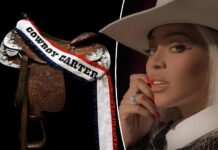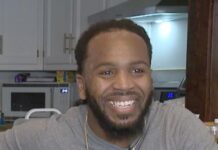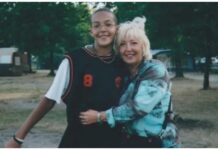
*Tune in TONIGHT (Sept. 16) to the television premiere of “Downsized” on TV One, starring real-life husband and wife Nicole Ari Parker and Boris Kodjoe as Ebony and Michael, a couple struggling to keep their family together after years of professional success take their personal toll. As a result, Michael desperately tries to hold onto everything he’s worked his entire life to gain. This leads the family on an unconventional adventure to restore the faith, hope, and trust that initially brought them together.
Written by Michelle McKissic and directed by Rhonda Baraka, “Downsized” is the 2016 ABFF TV One Screenplay Competition winner and the film had its world premiere at the American Black Film Festival in Miami.
Viewers will no doubt find the couple in “Downsized” similar to Boris and Nicole’s real-life marriage. So when EUR/Electronic Urban Report caught-up with Nicole to dish about the project, we asked if there were moments in the script that she connected with personally when it comes to relationship struggles.
“I guess you could say Ebony and Michael were kind of a moment in my personal life but I’ve learned how to communicate better and Boris learned how to communicate better,” she explained. “We don’t really have the same issues that Michael and Ebony have any more, so it was little bit sprinkled in there but it’s fun to act. It’s fun to make-believe. It’s fun to tell the stories that aren’t like you.”
Check out the rest of our Q&A with the actress below.
OTHER NEWS YOU MIGHT HAVE MISSED: Family Says Their Video DOESN’T Show Kenneka Jenkins Walking Into Freezer (WATCH Clip)

This is a such a unique and refreshing story. One thing that surprised me was that it’s the man who wants to keep his family together. Meanwhile, your character wants to run. Did you find these elements just as compelling when you were considering this film?
Nicole: Well, Michelle McKissic’s script was so amazing for so many reasons and that was one of them. She really captured what’s going on and what’s affecting most modern families these days. You have this particular couple who got pregnant when they were 14-years-old. Their family made them get married, do the right thing and focus, and you’re meeting them 25 years later. They both had a commitment to reevaluate that decision and that’s where the movie starts. But like you said, the husband is grappling with the feelings of, “I built something, and even though it wasn’t perfect, I built it.” Which is a wonderful take on the man — protective and pride of building his family. And the woman turning 40 and she’s done the right thing. Her kids are great, going to law school and she’s been a great mother and at 40 nowadays that’s when you can start your new life. You can change careers, you can write a book, travel, see the world, you’re grown, you’re confident, you’re ready. So here you have this modern woman struggling with staying or leaving and we see how this affects every single one in the family — including herself.
How much of your own persona is embedded in Ebony? How much from your marriage did you pull from?
Nicole: Well I think being a mother, I had a lot of natural instincts in terms of what creative choices to make in some of those scenes but I also took a lot of clues from the script. There were so many bits and pieces that I related to but there were also bits and pieces that I had to let the story tell itself in a way. Rhonda Baraka, who is such a great director that, having Ebony and Michael out in that open field discussing their problems, the landscape became another character. It just set the tone for how quiet and connected two people can be even when they’re disagreeing. And I’m a modern woman, so I have to always make my point and say what I need to say but I’ve slowly learned, in a longterm relationship, that you have to listen. You don’t have to be right. And sometimes when you settle into that the issue rights itself. So it reflected a lot of the growth that I’ve had. I think Boris did an incredible job in this film and when we screened it, a lot of men responded to his take on it. A lot of men don’t get credit for wanting what they created and build.
Of all the social issues that are woven into the fabric of this story, which is the most vital — the one you’re hoping truly resonates with the audience?
Nicole: I think the social media aspect is very big, that alone has demanded a new way of parenting. You’re not just sending your kid to school for eight hours a day and you have to see the kind of environment they’re in and take care them emotionally and make sure they’re competent young people. But now you’re dealing with millions of millions of impressions coming towards them. So you’re forced to fast-track what you teach them about the world. Why is there nudity out there? Why is it okay and why is it not okay and when is it okay? Saying bad words, expressing your feelings anonymously — who thought you would have to teach a 7-year-old something like this, or a 9-year-old? I think that alone is a big enough issue that I’m really grateful to be in a script that brought that up. Facebook, Instagram, Twitter, they’re part of our lives now. There has to be a reconnection with your humanity and especially when you’re dealing with your children.

Talk about how you and Boris feed off each other’s creative energy when you’re working together.
Nicole: The creative energy kind of happened when we first met on “Soul Food.” We met in a professional, working, creative environment — working 14 hours a day together, dealing with very intense storylines. We learned how to be professional. We learned how to work together and collaborate. That whole scenario kind of helped us get to know each other as artists but also as friends and develop a friendship. And we had the luxury to take our time. When you’re with someone for 14 hours a day, it’s kind of a marriage, in a way — or a friendship. You’re yourself. I mean, he saw me earlier in the morning — when I was my real self. With my do-rag and everything. There’s nothing like a 5:00 am call. So we really developed that muscle almost 17 years ago, so when we work together it’s easy. It’s great — it’s fun. We actually get along. We’re not dealing with all the nuts and bolts of practical life. We’re actually enjoying each other and most marriages lose that spark because they’re not doing the things they used to do together. And this is the thing we used to do together. Some couples used to hike and they don’t hike anymore. They used to cook together and they don’t cook anymore. We used to create together and we got the chance to do it again. It really makes us feel great.
Speaking of creative energy, talk about your experience working with Rhonda. Do you find female directors foster a unique kind of energy on set compared to men?
Nicole: No. I think the passion is the passion. I’ve had some real tough female directors. I’ve had some very sensitive female directors and male directors. I think that what’s great about Rhonda is her eye. Her eye for the shot and the emotional beat that she needs for that shot. She’s composing it — she’s a writer as well, so she’s really good at combing the environment with the actor’s instrument and she knows how to talk to you and make you understand both. And that’s really comforting. It made me stretch. It made me want to try it again, do another take and it was really a wonderful creative experience for both of us. She was great at dealing with Boris and I differently. Boris and I are very different and she dealt with us differently and it was wonderful to see her working with everyone really.
What can the viewers take away from this movie? Especially couples like Ebony and Michael?
Nicole: You can’t tell people to stay if that’s not their path. And you can’t tell people to run either, but I think what you have to do is realize you’re not the only one with this problem. Sometimes when you’re in your own life, you’re scared to speak up because you think, nobody else is going through this, or “I don’t even know how to put the words to what I’m feeling.” You have to realize that you’re not alone and have the courage to speak up in your most sincere way about what it is you’re struggling with. I’m unhappy. I’m lonely. I’m bored. I’m scared. I’m 40. I want to do more. I need your help, that’s a really big one for men and women to say. But if somebody goes first and the person you love is there for you to hear you out, there’s so many wonderful things that could happen.
After 12 successful years of marriage, what is your key to making it last so that divorce is not an option?
Nicole: I think it’s a little bit of the old-fashioned thing that your auntie or your grandmother told you, and that is: food and the love. You can’t let those two things die. And I think that you also have to check in with yourself and check in with your partner. Am I bringing negativity to the table? Or am I bringing positivity to the table? If not, how can I reevaluate what I’m going through and then with the other person, speaking up and saying, “I don’t like the way this is happening, or the way you speak to me or look at me or turn away,” or whatever it is that you’re going through, you have to talk. And that when you do-do the things like date night and movie night and taking a walk, you’re back on a wonderful page to keep writing your story together.
“Downsized” premieres on TV One Saturday, September 16, 2017, at 9 p.m. ET.
We sat down with the cast of #Downsized…tune in TONIGHT at 9/8c! #BTS pic.twitter.com/Ms0WJeD5eT
— TV One (@tvonetv) September 16, 2017
We Publish News 24/7. Don’t Miss A Story. Click HERE to SUBSCRIBE to Our Newsletter Now!





